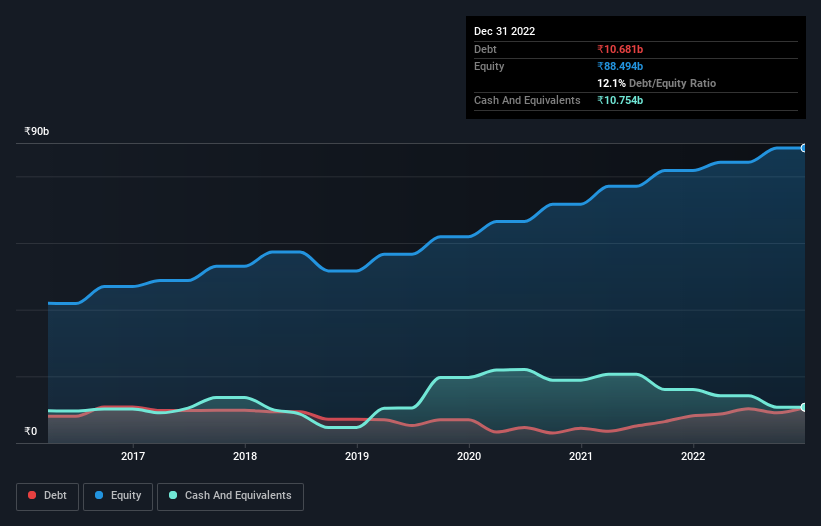
Howard Marks put it nicely when he said that, rather than worrying about share price volatility, 'The possibility of permanent loss is the risk I worry about... and every practical investor I know worries about.' So it seems the smart money knows that debt - which is usually involved in bankruptcies - is a very important factor, when you assess how risky a company is. As with many other companies Dabur India Limited (NSE:DABUR) makes use of debt. But the real question is whether this debt is making the company risky.
When Is Debt A Problem?
Debt is a tool to help businesses grow, but if a business is incapable of paying off its lenders, then it exists at their mercy. Ultimately, if the company can't fulfill its legal obligations to repay debt, shareholders could walk away with nothing. However, a more common (but still painful) scenario is that it has to raise new equity capital at a low price, thus permanently diluting shareholders. Of course, the upside of debt is that it often represents cheap capital, especially when it replaces dilution in a company with the ability to reinvest at high rates of return. When we think about a company's use of debt, we first look at cash and debt together.
See our latest analysis for Dabur India
What Is Dabur India's Net Debt?
You can click the graphic below for the historical numbers, but it shows that as of September 2022 Dabur India had ₹10.7b of debt, an increase on ₹8.18b, over one year. But on the other hand it also has ₹10.8b in cash, leading to a ₹72.7m net cash position.

How Strong Is Dabur India's Balance Sheet?
Zooming in on the latest balance sheet data, we can see that Dabur India had liabilities of ₹33.9b due within 12 months and liabilities of ₹5.07b due beyond that. Offsetting these obligations, it had cash of ₹10.8b as well as receivables valued at ₹10.2b due within 12 months. So it has liabilities totalling ₹18.0b more than its cash and near-term receivables, combined.
Having regard to Dabur India's size, it seems that its liquid assets are well balanced with its total liabilities. So it's very unlikely that the ₹951.4b company is short on cash, but still worth keeping an eye on the balance sheet. While it does have liabilities worth noting, Dabur India also has more cash than debt, so we're pretty confident it can manage its debt safely.
But the other side of the story is that Dabur India saw its EBIT decline by 2.8% over the last year. If earnings continue to decline at that rate the company may have increasing difficulty managing its debt load. The balance sheet is clearly the area to focus on when you are analysing debt. But it is future earnings, more than anything, that will determine Dabur India's ability to maintain a healthy balance sheet going forward. So if you're focused on the future you can check out this free report showing analyst profit forecasts.
Finally, a company can only pay off debt with cold hard cash, not accounting profits. While Dabur India has net cash on its balance sheet, it's still worth taking a look at its ability to convert earnings before interest and tax (EBIT) to free cash flow, to help us understand how quickly it is building (or eroding) that cash balance. During the last three years, Dabur India produced sturdy free cash flow equating to 73% of its EBIT, about what we'd expect. This cold hard cash means it can reduce its debt when it wants to.
Summing Up
We could understand if investors are concerned about Dabur India's liabilities, but we can be reassured by the fact it has has net cash of ₹72.7m. And it impressed us with free cash flow of ₹9.4b, being 73% of its EBIT. So is Dabur India's debt a risk? It doesn't seem so to us. The balance sheet is clearly the area to focus on when you are analysing debt. However, not all investment risk resides within the balance sheet - far from it. We've identified 1 warning sign with Dabur India , and understanding them should be part of your investment process.
If, after all that, you're more interested in a fast growing company with a rock-solid balance sheet, then check out our list of net cash growth stocks without delay.
New: Manage All Your Stock Portfolios in One Place
We've created the ultimate portfolio companion for stock investors, and it's free.
• Connect an unlimited number of Portfolios and see your total in one currency
• Be alerted to new Warning Signs or Risks via email or mobile
• Track the Fair Value of your stocks
Have feedback on this article? Concerned about the content? Get in touch with us directly. Alternatively, email editorial-team (at) simplywallst.com.
This article by Simply Wall St is general in nature. We provide commentary based on historical data and analyst forecasts only using an unbiased methodology and our articles are not intended to be financial advice. It does not constitute a recommendation to buy or sell any stock, and does not take account of your objectives, or your financial situation. We aim to bring you long-term focused analysis driven by fundamental data. Note that our analysis may not factor in the latest price-sensitive company announcements or qualitative material. Simply Wall St has no position in any stocks mentioned.
About NSEI:DABUR
Excellent balance sheet average dividend payer.
Similar Companies
Market Insights
Community Narratives



